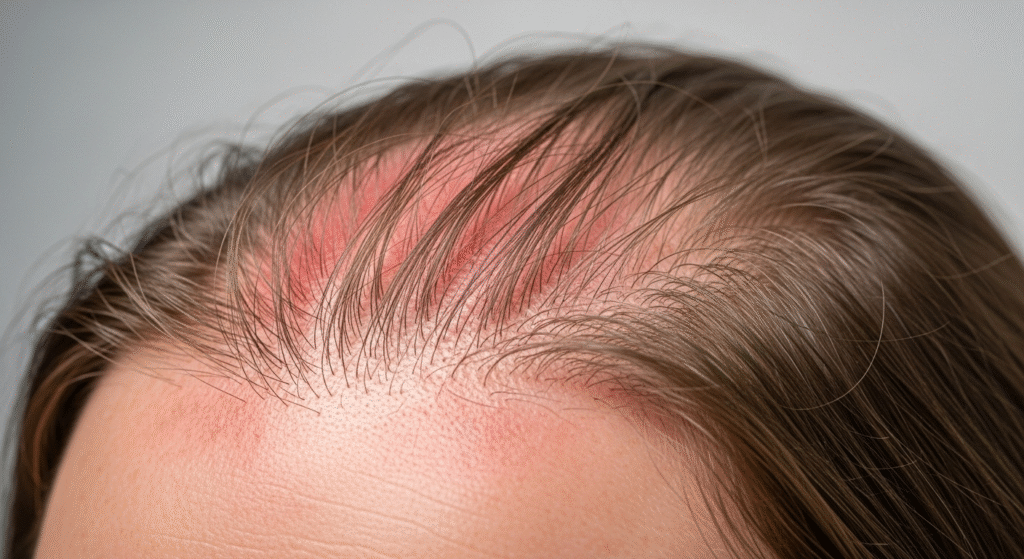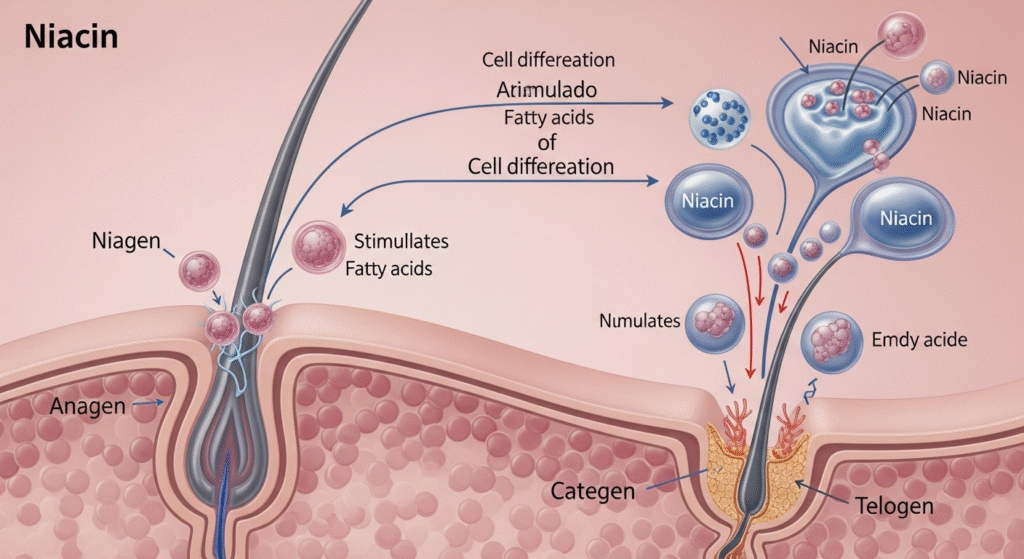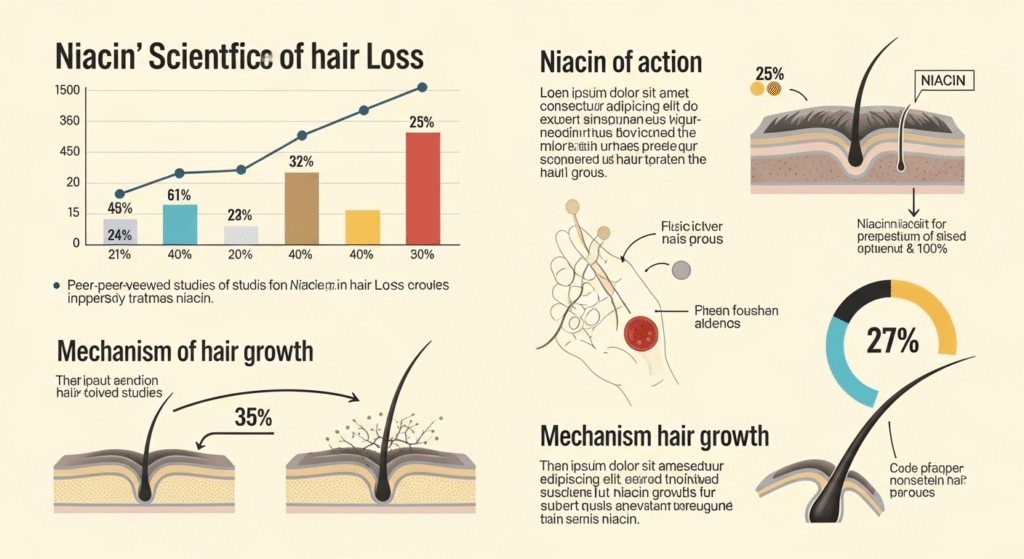Struggling with thinning hair and wondering if nutrition can help? Niacin hair loss is a topic gaining attention, as research suggests Vitamin B3 can enhance scalp circulation, reduce inflammation, and strengthen hair. In this post, you’ll learn how niacin works, discover the scientific evidence, explore safe application methods, and understand how to integrate it into …
Struggling with thinning hair and wondering if nutrition can help? Niacin hair loss is a topic gaining attention, as research suggests Vitamin B3 can enhance scalp circulation, reduce inflammation, and strengthen hair.
In this post, you’ll learn how niacin works, discover the scientific evidence, explore safe application methods, and understand how to integrate it into your hair health routine. Backed by expert insight and clinical trials, this guide equips you with effective, medically sound strategies for healthier hair.

What Is Niacin Hair Loss and Why It Matters for Hair
Niacin, also known as Vitamin B3, exists in two main forms: niacinamide and nicotinic acid. It plays vital roles in energy production, maintaining skin health, and reducing inflammation. For hair, niacin supports follicle function by:
- Improving blood flow to deliver nutrients and oxygen.
- Reducing scalp inflammation.
- Supporting keratin synthesis, which strengthens the hair shaft.
- Fighting oxidative stress, protecting follicles from damage.
These combined benefits make niacin a key nutrient worth exploring for people experiencing hair loss.
How Niacin Supports Hair Growth

Enhances Scalp Blood Circulation
Niacin promotes vasodilation, opening capillaries in the scalp. This boosts oxygen and nutrient delivery to hair follicles, supporting growth and reducing shedding. Studies show topical niacin analogs can enhance scalp circulation and hair fullness.
Reduces Scalp Inflammation
Boosts Keratin and Protein Synthesis
Hair structure relies on keratin, a protein enriched with B vitamins. Niacin supports the production of keratin, leading to thicker, stronger strands over time.
Fights Oxidative Stress and Aging Follicles
Scientific Evidence of Niacin Hair Loss Benefits

- A PubMed trial showed that women using a topical niacinamide derivative for six months had significant improvements in hair fullness and scalp thickness.
- A PMC study confirmed that niacinamide can delay the premature regression of hair follicles, prolonging the growth phase.
- Dermatologist Dr. Rachel Factor states, “Niacinamide promotes hair fullness by preventing early follicle shutdown,” reinforcing its therapeutic potential.
- Limitations: Most studies involve small sample sizes and cosmetic formulations; larger clinical trials are needed for more definitive conclusions.
How to Use Niacin Hair Loss
Dietary Sources
To increase natural intake:
- Include lean meats, fish (tuna, salmon), and poultry.
- Add mushrooms, green peas, and whole grains like brown rice and oats.
- Enjoy nuts and legumes for plant-based options.
Oral Supplements
Available as niacinamide or nicotinic acid supplements:
- Recommended upper intake level is 35 mg/day to avoid flushing or digestive discomfort.
- Pro tip: Start with a low dose and increase gradually under medical supervision.
- Caution: High doses can stress the liver and cause flushing. Monitor with periodic blood tests.
Topical Niacinamide and Nicotinic Acid
- Available in serums, shampoos, and ampoules formulated for scalp application.
- Nicotinic acid may produce a harmless flushing effect when first used.
- Always patch test before applying broadly.
- Consult a professional for prescription-grade formulations to ensure safety and effectiveness.
Potential Side Effects and Safety Considerations
- Flushing, redness, and warmth are common with nicotinic acid but typically disappear with repeated use.
- High doses of nicotinic acid may cause liver strain or gastrointestinal upset.
- Niacinamide rarely causes flushing and is usually well tolerated.
- Contraindications: Avoid during pregnancy, breastfeeding, or if you have liver disease or on medication like statins.
- Medical Reviewer Note Needed Here: Provide detailed dosage guidance and mention safe limits.
Niacin Hair Loss vs Other Nutrients for Hair Health
Here’s how niacin compares with other popular hair nutrients:
| Nutrient | Key Benefit | Notes |
|---|---|---|
| Niacin (B3) | Circulation, keratin formation, reduces inflammation | Must follow safe dosage guidelines |
| Biotin (B7) | Strengthens hair structure | Deficiency rare in healthy individuals |
| Vitamin D | Modulates hair growth cycle | Often low in hair loss patients |
| Zinc | Supports immune function | Imbalance may also cause shedding |
| Iron | Supports oxygen transport | Deficiency strongly correlates with hair loss |
A well-rounded multivitamin covering B3, B7, D, zinc, and iron is ideal for comprehensive hair support.
FAQs
1. Can niacin cause hair loss instead of preventing it?
In excessive doses—especially nicotinic acid—niacin might cause stress on the liver or hormonal imbalance, potentially leading to shedding. Staying within recommended limits helps avoid this.
2. Is niacin more effective orally or topically?
Both methods can be effective. Oral niacin supports systemic health, while topicals target the scalp directly. A combined approach often yields the best results.
3. How long until results appear?
Visible improvements generally appear after 8–12 weeks of consistent use. Optimal outcomes occur around 3–6 months, depending on individual scalp health.
4. Can I combine niacin with minoxidil or finasteride?
Yes. Niacin works through different mechanisms—circulation and inflammation—so it complements minoxidil and finasteride well. Consult your dermatologist for a tailored regime.
5. Who should avoid niacin supplements?
Avoid in cases of pregnancy, breastfeeding, liver conditions, or when taking medications like statins without consulting a healthcare provider.
Still Worried:
Ready to bring clarity to your hair health journey? Book a consultation with Dr. Uzma Irfan an IHSRS Certidied Doctor in Islamabad today to assess your nutrient levels, create a personalized niacin-based plan, and explore topical or oral strategies. Use our Niacin and Hair Health: Safe Usage Checklist for a head start on your hair recovery path.






